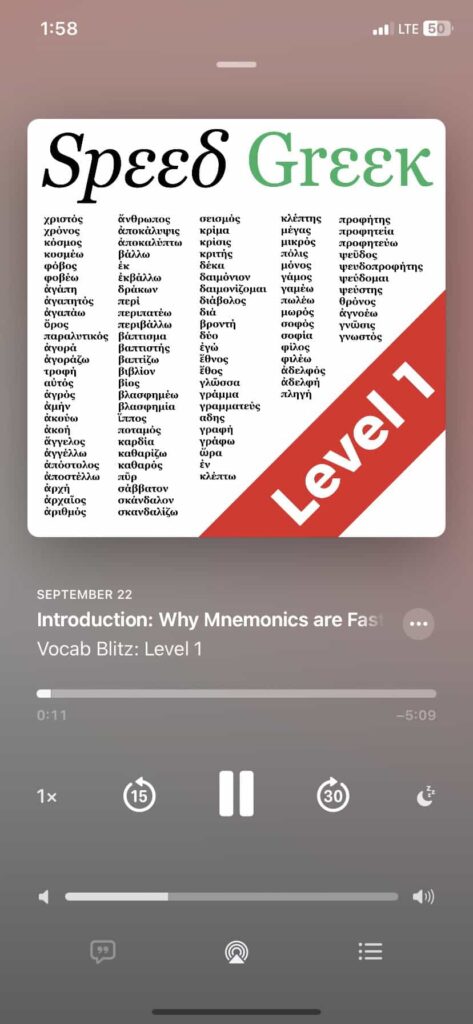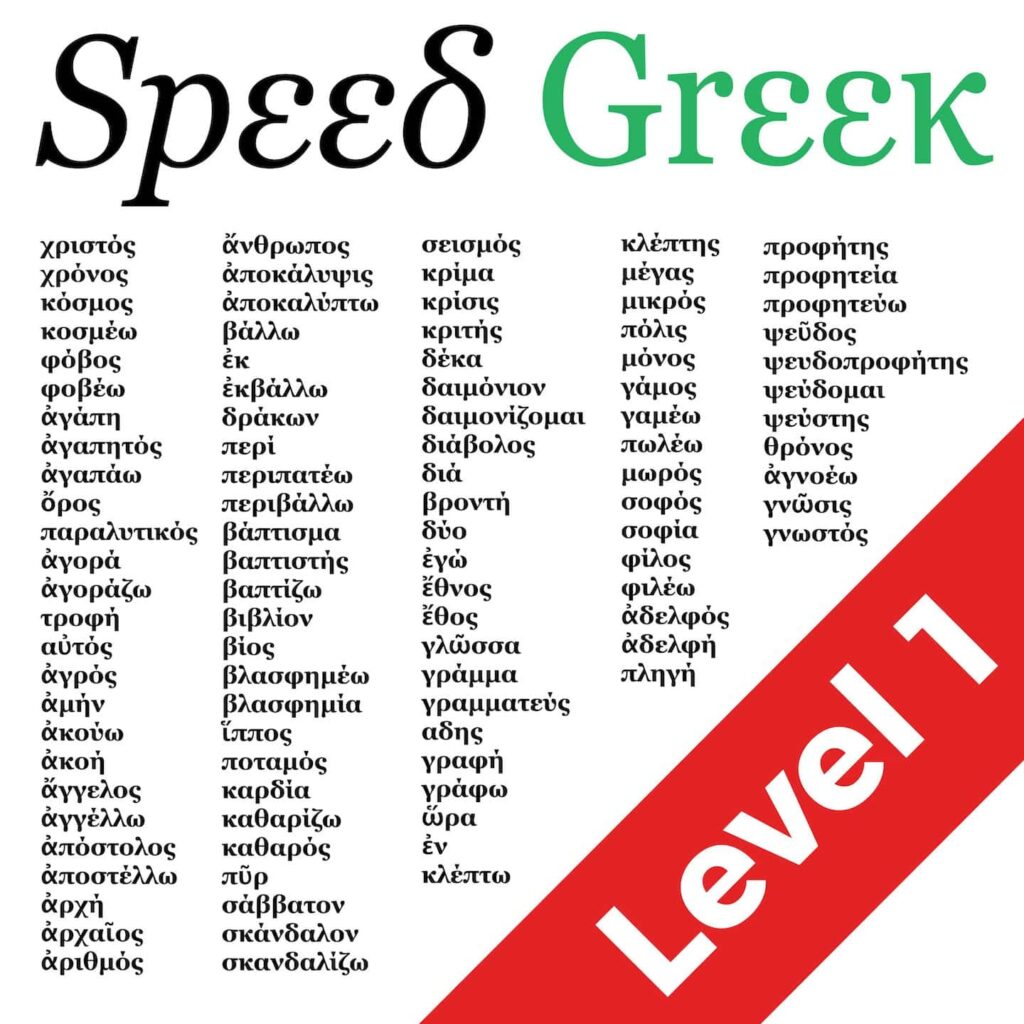What is the best way to learn Koine Greek?
There two main decisions you need to make when you begin studying Biblical or Koine Greek.
1. Do I focus on grammar or vocabulary?
2. Do I want to learn visually, over audio, or both?
In this article I explain the tradeoffs involved in these different approaches and give my recommendations on the fastest methods to learn Koine Greek.
Warning: my perspective is biased! Speed Greek’s own Vocab Blitz course is designed as a vocab-first, audio-first approach. I did it that way because that’s how I learned Koine Greek at such a fast pace. I’m just recommending to you what worked for me.

1. Grammar vs. Vocabulary
Most Greek books and courses focus on grammar, while presenting you with parallel vocab lists to memorize on your own time and with your own ingenuity. Unfortunately, this does not respect the way humans actually learn. If you focus on vocabulary first, grammar becomes easy. Someone with deep vocab knowledge can pick up grammar intuitively. The reverse does not happen: deep grammar knowledge does not simplify vocab acquisition.
If that’s the case, why do the vast majority of Biblical Greek resources focus exclusively on grammar?
| Grammar Focus | Vocabulary Focus |
|---|---|
| Bill Mounce – Basics of Biblical Greek Grammar (Most popular) | Trenchard – The Complete Vocabulary Guide the Greek NT |
| Merkle & Plummer – Beginning with New Testament Greek | Metzger – Lexical Aids for Students of NT Greek |
| Croy – A Primer of Biblical Greek | Spεεδ Greek – Audio mnemonics |
| Black – Learn to Read New Testament Greek | Visual flashcard apps (see the next section) |
| Zacharias – Biblical Greek Made Simple | |
| Schwandt – An Introduction to Biblical Greek | |
| Harris – An Introduction to Biblical Greek Grammar | |
| …and probably every other Biblical Greek textbook… | |
| Greek For All (online course) | |
| Bill Mounce’s Greek for the Rest of Us (book, online course) | |
| Biblical Mastery Academy (online course) |
If you are determined to pursue the grammar first approach, there are dozens of options to choose from. But there are relatively few resources available for a vocabulary first approach. Either way, eventually you have to slay the vocab dragon (Greek δράκων). The dirty little secret of Biblical Greek education is that nobody likes to focus on vocab…because it’s the hard part. It’s so much easier to drone on and on (in English!) about grammatical structures. This is easier both for the teacher and the student, because everybody can stay in their head and keep thinking and communicating in English, the only language they are actually comfortable with.
2. Visual Apps vs. Audio Mnemonics
Before we get into this head-to-head comparison, let’s briefly discuss the Trenchard and Metzger vocab books mentioned above. While they can be useful in certain situations, both are reference books. They are not designed to be read cover-to-cover, much less teach the material systematically.
The real question when it comes to vocabulary acquisition: Do you focus on visual flashcard apps, or audio mnemonics?
| Visual Flashcard Apps | Audio Mnemonics |
|---|---|
| The Greek For All Flash Cards app | Spεεδ Greek – Vocab Blitz |
| Danny Zacharias’ FlashGreek app | |
| Biblical Mastery Academy’s BMA Tutor app | |
| …there are more, but these are the ones we’re most familiar with |
We strongly believe the grammar vs. vocab question has only one right answer: vocab first! But when it comes to vocab-first approaches, the best solution will vary from person to person. Let’s discuss the pros and cons of these two very different approaches to learning Greek vocabulary. Hopefully one will stand out as the best approach for you.
Visual Flashcard Apps
All of the visual apps work in the same way. You are shown a simple picture along with a Greek word, and possibly a short sentence from the Bible. Your goal is to recall the English meaning. Depending on the app and mode, you fill in the English meaning on a multiple choice menu, or you simply mark (yes/no) whether you remember the English word.
Benefits
Downsides
The biggest issue here is that spoon-fed visuals can become a crutch. This has two main drawbacks. First, your recall will be hampered when the pictures aren’t there, as they won’t be when digging into the actual text of a Greek Bible. For fluent reading, you need instant recall of hundreds of words without the benefit of a single picture. Second, having someone else give you a picture short-circuits your own ability to visualize what you’re learning. Visuals created within and by your own mind are, not surprisingly, much easier for that same mind to recall later.
Audio Mnemonics: Spεεδ Greek
With Spεεδ Greek courses you have three options for vocab study: (1) use our private RSS feed to listen and navigate the lessons, exactly like any other podcast, (2) download the MP3 file and listen on your computer or smartphone, or (3) print out the PDF lesson and read it that way. Or combine audio and visual approaches for max efficiency.
Benefits
Downsides
We hope to launch Vocab Blitz: Level 3 soon, but until then only Levels 1 and 2 are available. Even so, there is no other product like Spεεδ Greek. If you need audio or hate rote memorization (like us!) this is the only option.

How Can Spεεδ Greek be 10x faster?
Other Greek courses rely heavily on rote memorization. That method is best for young children who are learning their first language. There is no reason for an adult to start from square one, as if you were an infant. That is too slow, and too boring.
MYTH: Children pick up languages faster and easier than adults.
Having already learned English, you have numerous phonetic and conceptual “hooks” in your mind. Our course hangs Greek vocab from these pre-existing hooks. This will allow you to learn Biblical Greek much, much faster than you learned your native English. This method was pioneered by James W. Heisig to teach Chinese characters (and Japanese kanji) to Westerners, achieving a 20x or more increase in the speed of vocabulary acquisition. (Read the introduction of Heisig’s book for details.)
Our early testing of the method adapted to Biblical Greek indicates that most students should expect a more modest increase of 10x the speed of rote memorization. However, the greater your English verbal fluency, the more likely you will achieve learning speeds closer to 20x that of rote memorization.
Spεεδ Greek‘s Vocab Blitz course roadmap plans to cover the New Testament’s most common 1030 Greek words. This is more than enough for you to read the entire Greek New Testament using a reader’s edition. These words are split into 7 difficulty levels, with roughly 100 words in Levels 1-5, and 250 words each in Level 6 and 7.
Most ancient Greek courses focus heavily on abstract grammatical concepts and on the printed text. But, like English, Greek is a phonetic language. Humans are wired to (1) listen to language before writing it and (2) master concrete vocab before abstract grammar. Watch any two year old, they aren’t tediously copying βάλλω by hand for all grammatical tenses. They start by saying “ballo” (throw) out loud while you throw them a ball.
Spεεδ Greek respects your God-given design for learning languages. The end result? Written AND verbal fluency.
Over 50% of surviving ancient literature is in Greek. It’s a treasure trove of wisdom far beyond just the New Testament. After the Spεεδ Greek program you will be reading (or listening to) the New Testament, early church fathers, the Septuagint, and much much more…and you’ll do it as if you were a native Koine Greek speaker.
The alternative?
Struggle with hieroglyphic text and obscure grammar until your eyes bleed, then eventually give up and stick with English translations.
Ready to master your first 102 words in Vocab Blitz: Level 1?
Vocab Blitz: Level 1

Affiliate Disclaimer
As an Amazon Associate, SpeedGreek.com earns from qualifying purchases. Amazon links to books on this page are affiliate links. If you click on them and buy something, we receive a small commission. Links to other website’s Greek courses and apps are NOT affiliate links. Our goal is to serve you by helping you find the best resources to learn Koine Greek (Biblical Greek). We hope you will choose Spεεδ Greek. But if you decide to pursue one of these other programs, we wish you the best and all success in your learning journey.